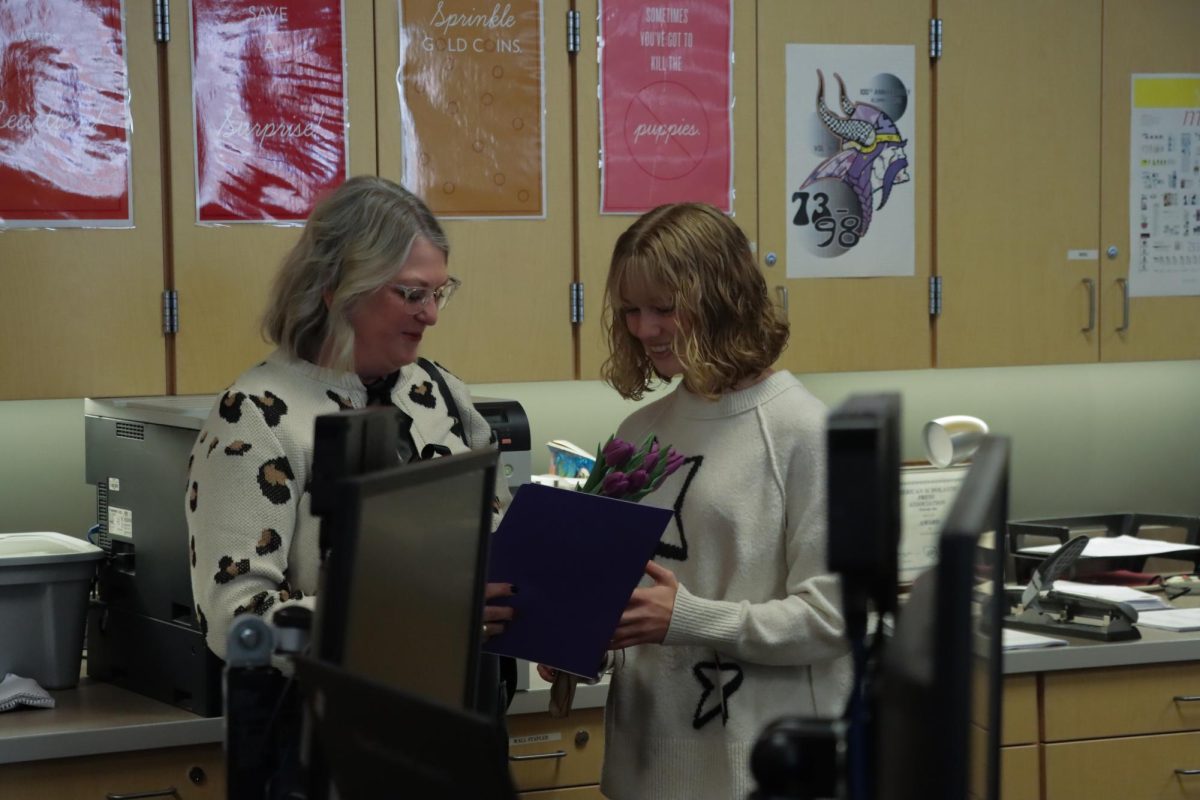About 1.2 million high school students take AP (Advanced Placement) exams each year. But what is the appeal these tests, and their subsequent classes, have for so many students?
A team effort.
Assistant Principal Cassie Ridenour is also the AP administrator. Ridenour says that she is only one person but making AP work at a comprehensive high school requires a team of individuals.
“Each school has AP teachers, an AP coordinator and an AP administrator,” Ridenour said. “I ensure the right teachers are teaching the right classes [and] that they get the right training to teach the right classes.”
In addition to helping teachers have the training and resources they need to help students be successful on the test, Ridenour says she is also there to help families.
“I answer questions, I support the families and, in some capacity, I support the actual testing that occurs,” Ridenour said.
Ridenour recommends that all students take courses that interest them, but students should also take at least one AP class to learn from the experiences and challenges that a college level course has to offer.
“I encourage any student that feels that they have any kind of strength in any given field to try an AP class…” Ridenour said. “The challenge in the learning is so substantially beneficial, that it’s worth being in the class.”
Some students may feel discouraged by the scores of the test, but Ridenour says that the experience is more powerful than the score.
“Even if you don’t pass the test, even if you don’t get a three or better on the test. The time in the class and the experience of taking the test is worthwhile in terms of particular programs,” Ridenour said.
Ridenour also highly recommends taking AP Seminar and AP Research because they are challenging classes that teach students a lot while still letting them have individuality with their research.
“I always like to lift up our Capstone program for a couple of reasons,” Ridenour said. “Both AP Seminar and the AP Research classes are unique in terms of what they offer to students,” Ridenour said.
Ridenour says that the research component of the class is 100 percent student centered.
“You are picking what you are researching. And if you are going the full Capstone diploma, it requires you to engage in numerous other AP classes. So, the level of rigor is outstanding and challenging and very beneficial to any student, even if college is not on your horizon,” Ridenour said.
Ridenour speaks about the various difficulties of an AP class and why they are important to think about.
“I wish students knew that it’s time consuming, it’s frustrating and it’s challenging. And all of those things are important in developing your cognition as a muscle, just as you would for any other muscle. [The teachers] have to put you through the ropes and through the paces to be able to achieve greater depth of thinking,” Ridenour said.
According to Ridenour, AP classes are all about learning from mistakes and being willing to ask questions.
“It’s going to be hard; it’s a college-level course. Even students who have often found easy success in school will be challenged by an AP class,” Ridenour said. “If you’re not willing to be uncomfortable, wrong, fail, ask questions and to grow from that it’s going to be a very hard year… That’s what every student needs to have to be successful in an AP class.”
The most beneficial thing a student can gain from taking AP courses is the experience they get from taking a college level class; they learn things they would not have previously known from high school education.
“I could talk about the usual college credit, but that’s really not why I encourage students to take AP,” Ridenour said.
Even if a student doesn’t earn college credit from the exam, Ridenour says the experience of taking the class is going to help them be more successful after high school.
“If you do go on to secondary education, a college education, you’re going to be more successful because you’ve already been exposed to it.,” Ridenour said. “You already have developed some of the study skills. You’re just more likely to continue on in that education.”
Misconceptions
A common misconception about taking AP courses is that it is not for everyone, but any student could be successful if they just put in effort.
“I think students that aren’t in AP think it’s not for them,” Ridenour said. “AP is about putting yourself out there, trying, asking questions and pushing yourself. Even smart kids are challenged by AP. There are structures in place to support every student to find success and to learn and to benefit from an AP class,” Ridenour said.
Benefits
Teacher Will Walker has taught various AP subjects such as AP US History, AP Psych and AP World History. Walker recommended taking AP World and APUSH because they are similar in writing, so if a student were to take one, it is easier to write in the other.
“I’d suggest AP World before you take APUSH. AP World and APUSH have the same format and you learn how to write as a sophomore. AP World you learn how to write correctly, you will learn how to write the essays that get ready for APUSH, like AP World builds you to APUSH,” Walker said.
Some of the benefits from AP is its effect on student’s writing and reading skills. Since it is a college level course it requires college level writing. Once a student learns how to write properly it will be a lot easier to write essays in college.
“I have a lot of students that come back now from college, and they talk to my new students. One thing I’ve noticed that they’re telling them is when they leave APUSH they write better essays in college and they’re getting A’s and A- ‘s on their essays,” Walker said.
AP classes, especially history and English AP classes teach students how to properly write at a college level.
“We teach you how to write for college and that’s a big thing. I didn’t even learn that until I got to college myself,” Walker said.
Walker says the most difficult thing about AP history classes is the large amounts of reading that is required.
“If it’s going to be one of the AP histories, it’s the reading. There’s a lot of reading, you have to read to understand things. I would say that, and the higher-level thinking, critical thinking that you have to do,” Walker said.
Walker then mentions student’s unnecessary stress for the AP exam. He says that they should focus on what they are doing currently instead of looking to the AP exam first.
“I thought you would ask me about the AP exams and my thoughts about AP exams and things like that. When it comes to students, and I would say one of the big things about that is I tell my students when they get it, don’t worry about it right now. No stress, learn how to get to the exam. Build, do what I ask, then you’ll get there,” Walker said.
Handling the workload
Junior Tannon Anderson has taken four AP classes his freshmen and sophomore year and is currently taking five AP classes.
“AP Research, AP Calculus and AP United States History usually take me the most work every night, but still not much. AP Chemistry and AP Computer Science don’t really have that much homework,” Anderson said.
Tannon says that he has had to figure out ways to get rid of stress through planning out his work.
“Sometimes, there’s a decent amount of work but as long as you manage your time properly, it’s not a huge deal,” Tannon said.
Tannon will talk about things teachers do that could aid him when he’s having difficulties in the class.
“Something a teacher could do to help me with my class and my mental health is to be there if I have any questions or struggles in the class and be ready and willing to help me,” Tannon said.
He has taken four AP Exams and says that they can be stressful but once they are done it gives you a sense of relief because all the hard work paid off.
“The AP Human Geography exam was very different than the others because it was online and somewhat shorter, but it wasn’t terribly difficult because I had spent a lot of time preparing. I describe it as relieving because I was able to be done,” Tannon said




